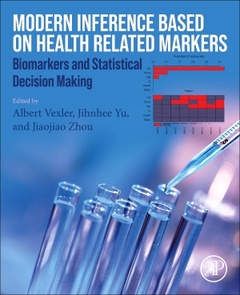Modern Inference Based on Health-Related Markers Biomarkers and Statistical Decision Making
Coordonnateurs : Vexler Albert, Yu Jihnhee, Zhou Jiaojiao

Modern Inference Based on Health Related Markers: Biomarkers and Statistical Decision Making provides a compendium of biomarkers based methodologies for respective health related fields and health related marker-specific biostatistical techniques. The book introduces correct and efficient testing mechanisms, including procedures based on bootstrap and permutation methods with the aim of making these techniques assessable to practical researchers. In the biostatistical aspect, it describes how to correctly state testing problems, but it also includes novel results, which have appeared in current statistical publications. In addition, the book discusses also modern applied statistical developments that consider data-driven techniques, including empirical likelihood methods and other simple and efficient methods to derive statistical tools for use in health related studies.
Part 1: Measure of Health via Biomarkers 1. Emergence of Modern Biomarkers based Developments in Health Studies 2. Cancer studies in light of advances in Biomarkers developments 3. Is Body Fat the Best Measure of Health? Part 2: Designing health investigations and their implementations 4. Topic: Pooling 5. Topic: Reproductive/perinatal epidemiology, epidemiologic methods Part 3: Special topics in Modern Epidemiology 6. Biomarkers use in Modified Risk Tobacco Products 7. Collider stratification bias due to censoring in prospective cohort studies 8. Roles of Biomarkers in breast cancer research and treatment Part 4: Biostatistical Toolkits to evaluate Health related Markers 9. Topics: Biomarkers data analysis and decision making mechanisms based on data subject to different sorts of measuring errors; Parametric and nonparametric procedures for biomarkers evaluations Part 5: Clinical Trials: practices and applications 10. Phase 1 11. Phase 2 Part 6: Genetic Markers 12. Biomarkers 13. Molecular Biomarkers 14. Cancer Biomarkers 15. Cancer epidemiology and biomarkers 16. Immuno oncology biomarkers 17. Biomarkers for the prognosis of cancer and prediction of treatment 18. Use of biomarkers for developing drug targets 19. Biomarkers and diseases 20. Biomarkers and Next-Generation Sequencing 21. Biomarkers and Radiology 22. Advances of Biomarker statistical evaluations 23. Clinical Applications of Biomarkers
Dr. Albert Vexler has belonged to the first cohort of investigators that proposed and discovered novel density-based empirical likelihood methodology. He has introduced the density-based empirical likelihood approach for creating nonparametric test statistics that efficiently approximate optimal parametric Neyman-Pearson statistics using minimum distribution assumptions on data. Recently, several statistical academic books referred the density-based empirical likelihood methodology to classical statistical procedures.
Dr. Jihnhee Yu obtained her PhD in Statistics from Texas A&M University in 2003. Currently Dr. Yu is Associate Professor at the State University of New York at Buffalo, Department of Biostatistics, and Director, Population Health and Health Observatory, School of Public Health and Health Profession, SUNY at Buffalo. She has authored and coauthored scientific paper
- Combines modern epidemiological and public health discoveries with cutting-edge biostatistical tools, including relevant software codes, offering one full package to meet the demand of practical investigators
- Includes the emerging topics from real health fields in order to display recent advances and trends in Biomarkers and associated Decision Making areas
- Written by researchers who are leaders of Epidemiological and Biostatistical fields, presenting up-to-date investigations related to the measuring health issues, emerging fields of biomarkers, designing health studies and their implementations, clinical trials and their practices and applications, different aspects of genetic markers
Date de parution : 03-2024
Ouvrage de 422 p.
19x23.3 cm
